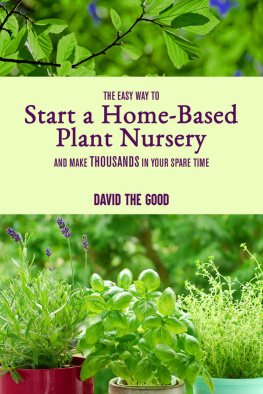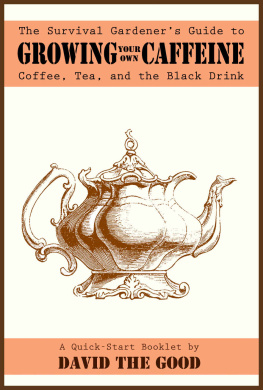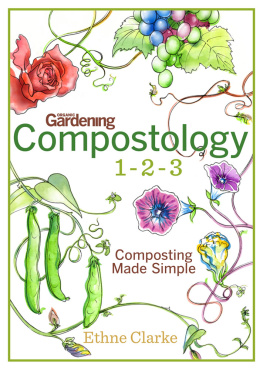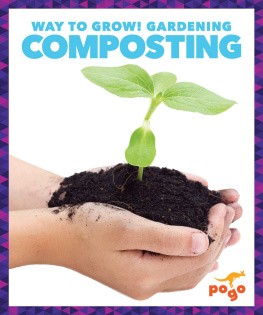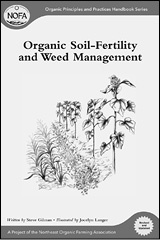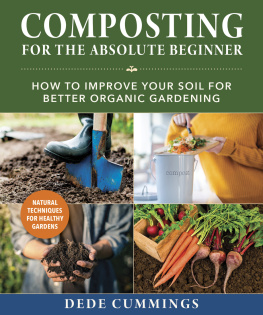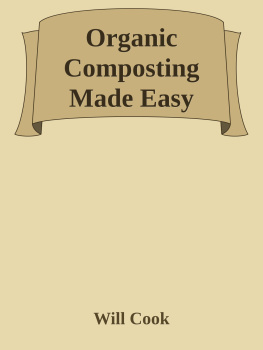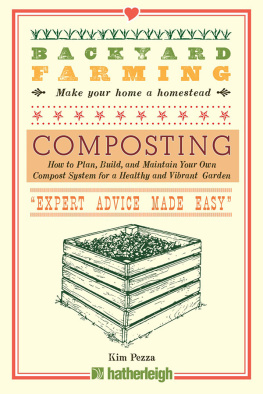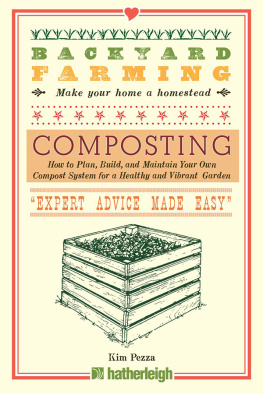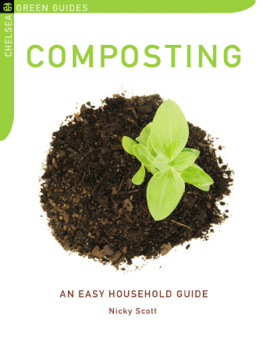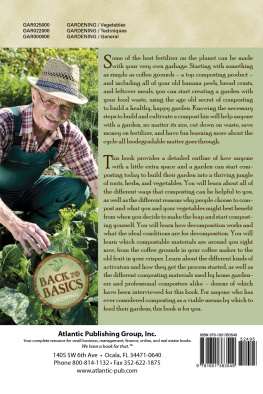Compost Everything: The Good Guide to Extreme Composting
by David the Good
Published by Castalia House
Kouvola, Finland
www.castaliahouse.com
This book or parts thereof may not be reproduced in any form, stored in a retrieval system, or transmitted in any form by any meanselectronic, mechanical, photocopy, recording, or otherwisewithout prior written permission of the publisher, except as provided by Finnish copyright law.
Copyright 2015 by David Goodman
All rights reserved
Cover Design: JartStar
Editor: Vox Day
Version 002
To Rachel.
Thanks for taking out the compost while I was writing.
Table of Contents
Introduction
Over the decades, various priests and prophets of composting have attempted to set in stone a list of rules defining exactly how a gardener should make compost.
This book throws out those rules.
You can compost a ridiculous variety of materials in a wide range of outrageous ways.
Food for your soil is everywhere. Unfortunately, this potential fertility often hits the trash rather than completing the nutrient loop and making its way back into the ground.
If you hate the trash you create, this book is for you.
If youre a rule-breaker and a visionary, this book is for you.
If youre ready to grow the best gardens youve ever grown, this book is for you.
Its time to break the chains and petty rules.
Its time to COMPOST EVERYTHING!
Thirty-Two Reasons to Compost
Before we get into the nitty-gritty, lets take a quick look at some reasons why composting is so valuable.
1. Composting saves money.
When you make compost, you potentially save money on water, fertilizer, and trash service.
2. Composting releases your inner fairy godmother.
Mice into horses, pumpkins into carriages, and kitchen scraps into black gold Bippity-boppity boo-yah!
3. Compost makes your plants happier.
Gardeners like happy plants and plants that get compost are definitely happy.
4. Composting reduces household waste.
Composting keeps your food waste out of the waste stream. You can compost paper, cardboard, and anything organic. That means fewer bags of trash and less smell from your trash cans.
5. Composting saves fuel.
Imagine how much gas could be saved if everyone quit chucking their food and yard waste and started composting instead. Just doing that on one property makes a difference. The less that needs to be hauled around, the better.
6. Composting keeps you from throwing away fertility.
Throwing away potential soil fertility is an utter waste, yet people do it all the time.
7. Compost made at home saves energy.
Homemade compost keeps you from traveling (which consumes energy) to buy factory-made fertilizer (which takes energy to produce) made from mined minerals (which take energy to mine), which are then packaged (which also requires energy and additional materialsusually plastic). If youre already gardening organically, making compost also keeps you from traveling to buy organic amendments, which still require collecting, bagging, and packaging.
8. Composting is enjoyable.
Whether you make layers or just throw it in a pile to rot, creating compost is fun. Think of it as a big rotten food fight.
9. Compost made at home is safer than compost purchased at a store.
Purchased compost can contain almost anything from pesticides and herbicides to weed seeds to heavy metals.
10. Compost builds soil.
This goes without saying, but its still a wonderful thing.
11. Compost saves water.
Adding compost to your soil significantly increases water retention, which means youll have to water less.
12. Compost feeds the microorganisms in your soil.
Although microscopic life is easy to forget, its also a vital part of your soils health. It is a great big web of life with many checks and balances. Adding compost keeps this web happy and active.
13. Compost makes your crops taste better.
More nutrition in the soil equates to more nutrition in your vegetables, which results in more flavor! You can literally taste the difference between vegetables grown in poor soil and vegetables grown in nutrient-rich soil.
14. Compost acts like a slow-release fertilizer.
Many gardeners feed plants with a blast of chemical fertilization that rapidly leaches through the soil and beyond the root zone, upsetting the soil web in the process. Compost instead provides a slow, gentle flow of nutrition to your plants.
15. Compost feeds the worms in your soil.
Worms tunnel through the ground opening up passages while leaving their nutrient-dense castings behind. They are natures gentle little tilling machines, and they love to chow down on compost, dragging it down into the root zone.
16. Composting keeps organic matter out of the water supply.
Letting nitrogen-rich organic matter lie around increases the risk of contaminating water supplies. This can be seen on a large scale with factory farming, where massive concentrations of manure end up running off into local streams, ponds, lakes, and other bodies of water, causing unhealthy algae blooms and the proliferation of disease-causing bacteria. Composting allows for the healthy breakdown of waste materials before they end up in the wrong place.
17. Compost feeds the fungi in your soil.
Mushrooms and other fungi digest rocks, wood, and other debris, making minerals available to plants and trees. Compost gives them something (figuratively) to chew on.
18. Compost improves clay.
Theres nothing like some good organic matter to moderate a heavy clay soil. Cracked, rocky, hard clay can be turned into loamy soil with repeated additions of compost.
19. Compost improves sand.
Sand is loose and lets water and nutrients run through. Compost helps it hold on to the good stuff for a lot longer.
20. Composting gives you gardening street credibility.
Seriously, man. You dont compost? What kind of gardener are you?
21. Compost can fight erosion.
Adding organic matter to the soil allows it to both absorb more water and support more plant life. This gives compost-rich soils an advantage over neighboring ground in times of heavy rainfall.
22. Compost increases the nutrients in your vegetables.
When you feed the soil around your plants, youre feeding yourself. Healthy plantsand peopleneed a wide variety of micro nutrients. Good compost has them.
23. Composting keeps fertility on your property.
When you throw away your leaves, food scraps, and other organic matter, you are throwing away minerals you should be keeping on your homestead. Dont do it.
24. Composting regains some of the money you lose on food.
Did your toddler mangle his plate of peas and chicken and then walk away? Composting that failed meal means you regain a little of the energy you lost buying and preparing it.
25. Composting turns liabilities into assets.
When you have to pay to dispose of food scraps, poop, logs, and eggshells, they are liabilities. Turn them into compost, and they become assets.
26. Composting binds up toxins.
Studies have shown that some toxic substances can be rendered inert when theyre composted and thereby incorporated into complex molecules. In an increasingly toxic world, its good to know we can fight back a little.


